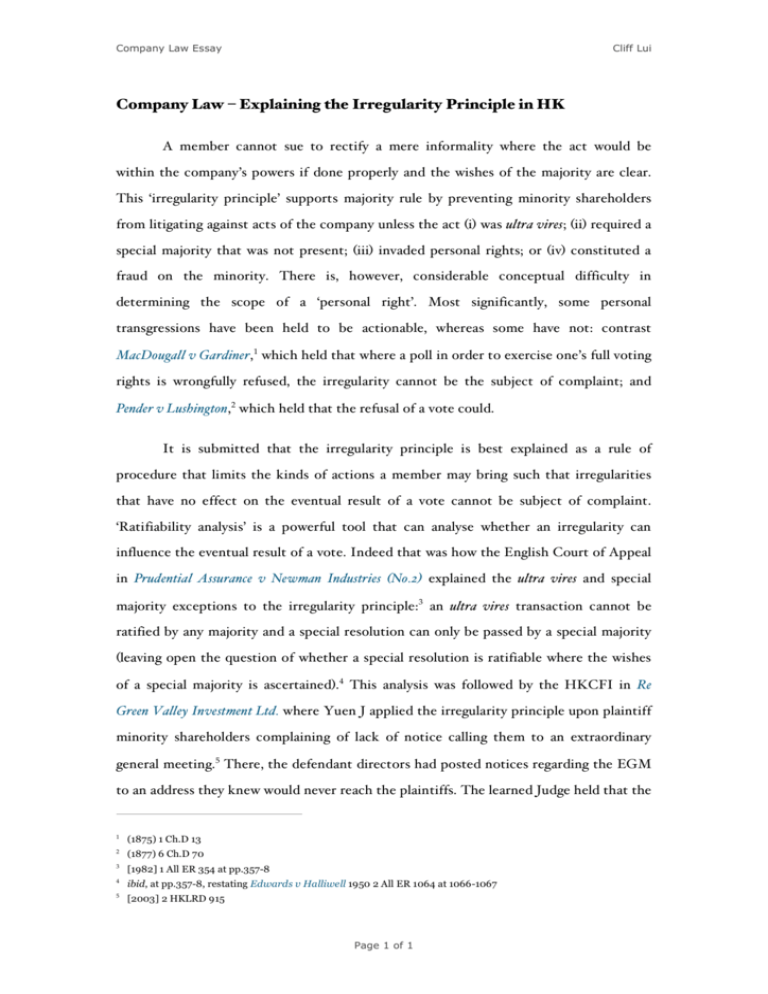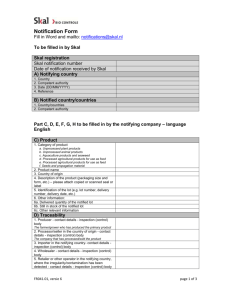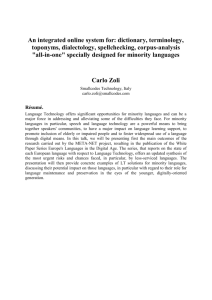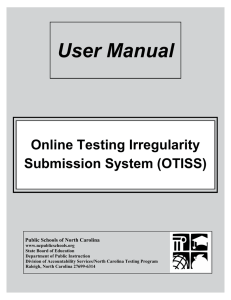2007 Company Law – Irregularity Principle
advertisement

Company Law Essay Cliff Lui Company Law – Explaining the Irregularity Principle in HK A member cannot sue to rectify a mere informality where the act would be within the company’s powers if done properly and the wishes of the majority are clear. This ‘irregularity principle’ supports majority rule by preventing minority shareholders from litigating against acts of the company unless the act (i) was ultra vires; (ii) required a special majority that was not present; (iii) invaded personal rights; or (iv) constituted a fraud on the minority. There is, however, considerable conceptual difficulty in determining the scope of a ‘personal right’. Most significantly, some personal transgressions have been held to be actionable, whereas some have not: contrast MacDougall v Gardiner,1 which held that where a poll in order to exercise one’s full voting rights is wrongfully refused, the irregularity cannot be the subject of complaint; and Pender v Lushington,2 which held that the refusal of a vote could. It is submitted that the irregularity principle is best explained as a rule of procedure that limits the kinds of actions a member may bring such that irregularities that have no effect on the eventual result of a vote cannot be subject of complaint. ‘Ratifiability analysis’ is a powerful tool that can analyse whether an irregularity can influence the eventual result of a vote. Indeed that was how the English Court of Appeal in Prudential Assurance v Newman Industries (No.2) explained the ultra vires and special majority exceptions to the irregularity principle:3 an ultra vires transaction cannot be ratified by any majority and a special resolution can only be passed by a special majority (leaving open the question of whether a special resolution is ratifiable where the wishes of a special majority is ascertained).4 This analysis was followed by the HKCFI in Re Green Valley Investment Ltd. where Yuen J applied the irregularity principle upon plaintiff minority shareholders complaining of lack of notice calling them to an extraordinary general meeting.5 There, the defendant directors had posted notices regarding the EGM to an address they knew would never reach the plaintiffs. The learned Judge held that the 1 (1875) 1 Ch.D 13 2 (1877) 6 Ch.D 70 3 [1982] 1 All ER 354 at pp.357-8 4 ibid, at pp.357-8, restating Edwards v Halliwell 1950 2 All ER 1064 at 1066-1067 5 [2003] 2 HKLRD 915 Page 1 of 1 Company Law Essay Cliff Lui choice of service of notice must be made in good faith and that the defendants had not acted bona-fide in choosing a method through which notice would not reach the plaintiffs. Yuen J applied the irregularity principle strictly, holding that that the plaintiffs were not entitled to complain because the majority shareholders could set the irregularity right (ratify the irregularity) any moment. Anyhow, the justice of the case did not appear to lay with the plaintiffs, since they were, in substance, objecting to the majority’s decision to prejudice their private and personal interests unrelated to the company. It is important to understand that for the ‘ratifiability’ test to work, the views of the majority (or special majority where the resolution in question requires) must be readily ascertainable by a complaining shareholder at the time he brought suit. If the majority’s views were not readily ascertainable, then the courts would not be able to determine the effect of the irregularity upon a particular resolution, and it would be pernicious to allow the irregularity to pass.6 What about the dichotomy between MacDougall and Pender? It is submitted that Pender is an anomaly that approached the facts while considering shareholder’s justice. It is interesting to note that the dichotomy arises out of a single paragraph towards the end of Jessel MR’s judgement, where he opined that the company should record a shareholder’s vote “as that is a right of property.”7 This statement does not consider the negligible effect a minority vote will have on the result of a meeting and is inconsistent with the spirit in MacDougall where James LJ, sitting in a superior court, said that judges “do not sit here to express an opinion on something which may lead to no potential result.”8 Jessel MR’s judgement at first instance best emphasises the importance that English law traditionally placed on personal property before enhanced protection for minorities were enshrined in statute. The fundamental question therefore, is whether a minority shareholder is even entitled to have his vote recorded. To that, the higher court, that is, the Court of Appeal in MacDougall already had an answer: minority shareholders are not entitled to have a 6 This is recognised by Baxter at p.108 of his article, note 17 below. 7 ibid. at p.81 8 ibid. at p.25. This principle is also recognised in Hong Kong by the Court of Final Appeal – per Bokhary PJ in Ng Siu Tung v Director of Immigration FACV 1-3/2001 at ¶352 albeit in a different context. Page 2 of 2 Company Law Essay Cliff Lui meeting held in strict form so that they could try to persuade the majority shareholders their way.9 Moreover, the piecemeal development of ‘exceptions’ that might gain status of a ‘personal right’ on grounds of justice has also been rejected, albeit obiter, by the English Court of Appeal in Prudential.10 In Hong Kong, Re Green Valley precluded shareholders from exercising basic rights that may be said to have a proprietary nature – the right to notice to meetings and consequently, the right to vote at the meeting. This decision directly contrasts with Pender. In precluding the plaintiff from taking action against such a blatant breach of personal rights, Yuen J clearly intended to extend the irregularity principle to these ‘proprietary’ rights, expediting judicial process in the spirit of MacDougall. There is one more reason why the irregularity principle should cover personal rights. Article 23 of the Companies Ordinance deems the memorandum and articles of association to be a contract between the members themselves and the company, so a member has the right to enforce the provisions of the memorandum or articles. Article 23 thus provides a clear scope of personal rights which may, according to Pender and repeated in Edwards,11 lie outside the scope of the irregularity principle. It seems strange, however, for a member to be able to challenge every departure from those documents if doing so would not change the ultimate result. Mellish LJ clearly identified the inconvenience in MacDougall when he observed that not everyone in a company is a lawyer and departure from the strict rules was thus inevitable.12 If every ‘irregularity’ could be challenged as an invasion of some personal right, businesses would be brought to a standstill. One might bemoan that such a blanket extension of the irregularity principle deprives minority shareholders of their personal rights and may result in them being at the mercy of the majority who are advancing their own interests at the expense of the company. In fact, Smith denounces any analyses that would affect the personal action in 9 See Re Green Valley, ibid. at p.925 10 ibid. at p.366 11 ibid. note 4 12 ibid. p.25 Page 3 of 3 Company Law Essay Cliff Lui any way.13 Nevertheless, it is submitted that such criticism could only be entertained before the time statutory derivative actions and statutory actions against unfairly prejudicial conduct came into force in Hong Kong. Furthermore, allowing minority participation in meetings where the majority view is known can only afford them the exercise of a property right, which is not going to affect the results. What is important is that the minority shareholder’s interests are protected from any abuse by the majority. If the company does not prejudice the interests of the minority, there is scant reason to complain. Since 2005, the Companies Ordinance (CO) has had clear provisions whereby minority shareholders can initiate derivative action against directors’ breach of duty; 14 complain against company actions unfairly prejudicial to them as members;15 and wind up the company if they can persuade the courts to think it fair and equitable to do so.16 It is submitted that an aggrieved shareholder is best poised to take advantage of statutory provisions, whose wider and more constructive remedies apply not only to unfairly prejudicial invasions of personal rights, but also to directors’ misfeasance. The articles of both Baxter and Smith suffer from having been written in an era without effective statutory protection of minority shareholder rights – it is inevitable that they relied on the common law to find ways to escape the harshness of the majority rule in the interests of shareholder justice.17 Smith recognises that a large degree of legal policy is involved in the personal action but he noted that there was little evidence to suggest a “flood of litigation or other undesirable effects” that might arise from liberating the personal action.18 This ‘rationale’ against restraining the personal action is objectionable because their remains the risk that companies will be subject to unnecessary litigation that is lengthy and costly when they fall foul of the rules, beyond what can be considered ‘a technicality’. Smith also relies heavily on the observation that irregularities in special resolutions are challengeable 13 See note 17 below at p.153 14 CO §168 misfeasance 15 CO §168 unfair prejudice 16 CO §168 equitable winding up 17 C. Baxter, “The Role of the Judge in Enforcing Shareholder Rights”, (1983) 42(1) CLJ 147; and RJ Smith, “Minority Shareholders and Irregularities”, (1978) 41 MLR 147. Both written before the Companies Act 1985. 18 ibid. at p.157 Page 4 of 4 Company Law Essay Cliff Lui without reference to the size of the majority.19 That observation no longer sits well with the case of Prudential, which implied that a special majority could ratify an irregular special resolution. Smith’s attempt to undermine the MacDougall line of cases by restraining it to its specific facts is unwarranted and fails to take into account the most important judicial undertones that accompany the decision, namely that futile litigation is to be avoided.20 Smith ultimately fails, however, to adequately explain the scope of the personal right, admitting: “it is impossible to make a comprehensive list of those irregularities which can invalidate a resolution”.21 Given recent substantial improvements to minority protection in Hong Kong, it is submitted that the better approach is to treat the irregularity principle as a rule of procedure that governs which actions can be pursued by minority shareholders at the outset to preclude futile litigation. In this sense, Baxter’s support for the irregularity principle to cover personal rights is desirable, though the irregularity principle can be more simply applied through an ‘effects test’. So long as the irregularity has no effect on the eventual outcome and does not result in unfair prejudice or allow misfeasance by the directors (or anything against statute), it cannot be the subject of complaint. This desire for expediting cases and increased certainty is shown by the Consultancy Report on the Review of the Hong Kong Companies Ordinance, which boldly denounced the rule of Foss v Harbottle (or more likely, its array of ‘exceptions’) as an unruly ghost that is best laid to rest with legislation.22 The irregularity principle is best explained as a gateway through which pointless litigation must be dropped, regardless of whether the action is personal. Commercial convenience is safeguarded yet statutory provisions protect minority shareholders from majority decisions that may harm their or their company’s interests. The strict application of the irregularity principle as a procedural rule for the speedy resolution of cases is essential in company law and the operations of small and medium enterprises, which are a mainstay of the Hong Kong economy. 19 ibid. at p.156 20 ibid. at pp.158-9 21 ibid. at p.150 22 Also consider that Foss v Harbottle 2 Hare, 461 was decided before 19th century statutory company law. Page 5 of 5








